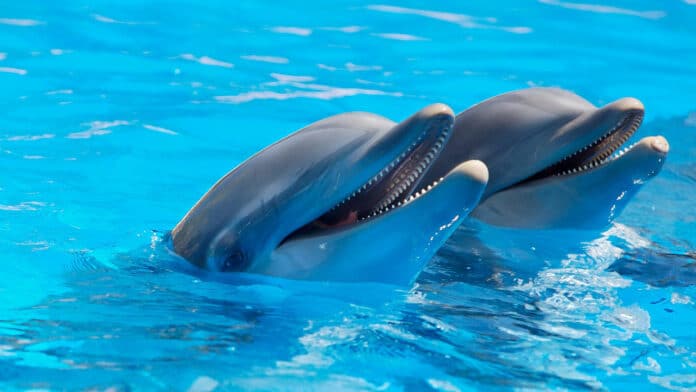Understanding the impact of human disturbance on wildlife populations is of societal importance, with anthropogenic noise is known to impact a range of taxa, including mammals, birds, fish, and invertebrates. While animals are known to use acoustic and other behavioral mechanisms to compensate for increasing noise at the individual level, our understanding of how noise impacts social animals working together remains limited.
In a new study, a University of Bristol-led team of researchers investigated the effect of noise on coordination between two bottlenose dolphins performing a cooperative task. They found that the dolphins working collaboratively are less successful in the presence of sound generated by a human.
Two trained and highly driven bottlenose dolphins at the Dolphin Research Center in Florida, USA, were given suction-cup attached tags by scientists working with worldwide colleagues. This allowed scientists to record the dolphins’ vocalizations while cooperating on a task. The dolphins had to cooperate to press their respective underwater buttons simultaneously while being subjected to progressively stronger levels of noise during the task.
Lead author Pernille Sørensen from Bristol’s School of Biological Sciences said: “For years, we have known that animals can attempt to compensate for increased noise in their environment by adjusting their vocal behavior. Our work shows that these adjustments are not necessarily sufficient to overcome the negative impacts of noise on communication between animals working together.”
Bristol’s Dr. Stephanie King, senior author, added: “It also shows us that dolphins can flexibly modify their vocalizations to continue cooperating with their partner, revealing that this species is capable of actively coordinated collaboration.”
Sørensen said, “Working with our colleagues at the Dolphin Research Center in Florida, we had a unique opportunity to study the negative effects of noise on cooperative behavior in a controlled setting, which is almost impossible to do in the wild. Our findings highlight the need to account for how noise affects group tasks in wild animals.”
Dr. King explained: “We show that human-made noise directly affects the success of animals working together. If noise makes groups of wild animals less efficient at performing cooperative actions, such as cooperative foraging, this could have important negative consequences for individual health, and ultimately population health.”
Journal Reference:
- Pernille M. Sørensen, Abigail Haddock et al. Anthropogenic noise impairs cooperation in bottlenose dolphins. Current Biology. DOI: 10.1016/j.cub.2022.12.063
